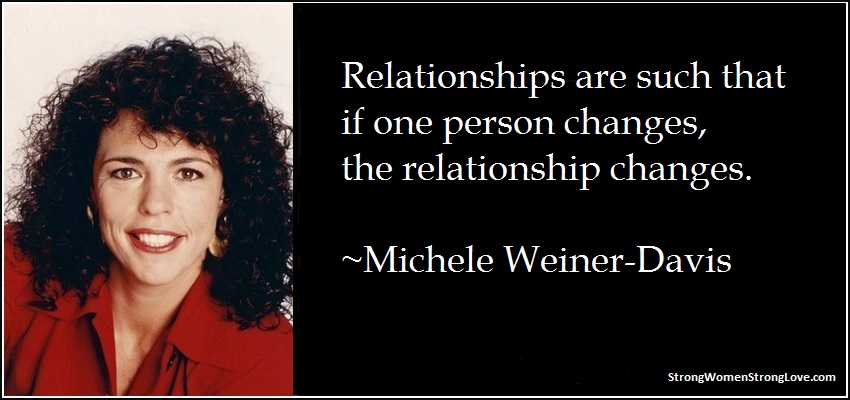by Strong Women Strong Love | Jan 1, 2019 | Poisonous Patterns |

Back before Thanksgiving, you gave yourself an ultimatum: I’m just going to get through the holidays, and then I’m telling him it’s over. Now here we are in the new year, and it’s your moment of truth. You have to make the final call: Should you leave your husband?
This is one of the most wrenching decisions a woman can face. As you consider ending your marriage, know that you’re far from alone. Women are thought to initiate between 70 percent and 80 percent of divorces.
Some of those marriages, of course, are irretrievably broken. Others, though, could be saved. Without counseling you in person, I can’t know which category your own marriage falls into. But what can I do is give you some final questions to consider before you leave so that you can be at peace with your decision, whatever it turns out to be.
Did You Ask For What You Need?
I’m not talking about complaining. That’s all too common among women in unhappy relationships. And at some point, husbands just check out and stop hearing them. What works instead is speaking up clearly and kindly for what you need. Maybe that means negotiating a shift in the domestic workload. Or it could mean learning to be more clear about what you expect from your husband.
Did You Address the Serious Issues?
If you are leaving your husband because his addiction, abuse or mental impairment, have the two of you sought help for these specific issues? If you haven’t, is he willing to? (Please, please keep your own safety front and center as you consider this question.)
What Have You Learned?
Whether you decide to leave your husband or stay and work on your marriage, it’s important to understand what went wrong in your relationship, and the role that both of you have played in creating the current situation. It may seem like everything is all his fault, but most relationships are more complex than that. Working to better understand yourself, your husband and how you relate to each other could save your marriage. But even if you go through with leaving your husband, you still need to do this difficult inner work. If you don’t, you could be setting yourself up for another failed relationship.
Your answers to these questions might affirm that divorce is right choice for you, or they could encourage you to give your marriage another shot. If you opt to stay for now, I encourage you to seek relationship counseling. You and your husband can also use the practical strategies in my book Strong Women, Strong Love to start to repair your relationship.
by Strong Women Strong Love | Sep 14, 2017 | Poisonous Patterns |

What happened to your relationship?
You and your husband rarely focus on each other anymore. Instead, you’re at work, on your phones or wrapped up in the kids’ activities. You aren’t really sure what’s going on in each other’s lives – and you’re not interested enough to ask.
It’s all so different from when you first fell in love and couldn’t get enough of each other.
If one or both of you are emotionally checked out from your marriage, it doesn’t mean that passion and deep connection are gone forever. But it does mean that it’s time to give your relationship some TLC.
What Happened to the Spark?
There are some good reasons you and your husband were so irresistible to each other when your relationship was new. You gave each other your undivided attention, made each other feel important, and did interesting things together. It probably didn’t hurt that you were also at the mercy of powerful hormones that filled you with desire and made you emotionally open.
But in every lasting relationship, those intense feelings eventually subside. Because novelty eventually wears off, all the things that attracted you to each other at first seem routine now.
On top of that natural evolution, unrelenting work and family commitments can pull you away from each other: it’s hard to connect with anyone when you’re distracted, tired, and just need to decompress.
How to Check Back In
But here’s the good news: Even though passion and connection aren’t automatic anymore in your relationship, they can still flower again with some cultivation. Here’s how to do it.
- Prioritize you marriage. I get it: You have lots of other priorities. It’s hard to find time for your relationship. But it’s imperative that you do. Otherwise, you’re at risk of slipping from distraction into complete disconnection. Investing in your marriage pays off. When your marriage is strong and you feel connected to your partner, it’s easier to face life’s other challenges.
- Change things up. As I mentioned above, one of the reasons people emotionally check out of their marriages is that everything feels routine. Even a small change — like vacationing somewhere new — can reignite a sense of novelty and intrigue. If your husband isn’t game to explore something different right now, do it yourself. The energy you’ll get from taking a class or pursuing a new hobby should rub off on him and get him onboard.
- Get curious. False assumptions about each other might be behind your disengagement in the marriage. For example, maybe it seems like your husband works constantly to avoid time with you. You might be right, but it’s also possible there’s something else going on. Maybe he’s putting in extra time because he’s nervous about his job security. Take some time to plug back in and find out the real stories behind each other’s behaviors. My blog post about curiosity can help you get started.
- Tame your phone addiction. Those little devices can be a huge distraction in a relationship. Your phones make it easy to keep each other at arm’s length. Try some gradual shifts to change your phone habits. For example, make it a point not to glance at your phone when you’re talking with your husband.
- Seize every moment. You probably checked out of your marriage gradually over time. In the same way, rebuilding your connection is also a process. Even if you have just a few minutes each day to focus on your relationship, they can be powerful if you are truly present for each other.
If you’d like to further explore the ideas from this blog post, check out my book Strong Women, Strong Love. It has many more strategies for maintaining a connection with your partner amid our busy, stressful lives.
by Strong Women Strong Love | Aug 1, 2016 | Passionate Partnership, Poisonous Patterns |

I recently had the opportunity to hear author and marriage therapist Michele Weiner-Davis speak.
Weiner-Davis is the author of Divorce Busting, among other books. As you can tell from that book title, the heart of her approach is about helping couples avoid divorce if at all possible.
I think her work is interesting and useful. One of Weiner-Davis’ resources that I’ve been sharing with my clients is The Last Resort Technique. It’s something you should read immediately if you feel that your marriage is in serious jeopardy. Weiner-Davis defines this as your husband filing for or definitively asking for divorce, being separated from each other, or still living together, but with little to do with each other.
The steps in the Last Resort checklist align with advice and strategies I’ve written about here in this blog and in my book, Strong Women, Strong Love.
Call off the Chase
As a first step to saving your marriage, Weiner-Davis advises “stop the chase.” That means no calls, buying gifts, etc.
In a past blog post on handling a separation, I wrote about why this strategy works:
If your husband does actually leave the house, don’t pressure him to come back. Allow him to experience the reality of what divorce from you would mean. … Give him space to understand your importance in his life. It’s possible he’s not interested in reconciliation and will eventually want a divorce. It’s also possible that if he truly experiences a separation, he’ll eventually start missing you and the life you have built together.
I’ve also written about how research has shown that a pattern of chasing isn’t good for marriages:
In technical terms, the pattern in which one spouse wants to confront the issue and the other withdraws from such a discussion is the pursuer/distancer pattern. E. Mavis Hetherington’s landmark study of 1,400 divorced individuals found that couples who routinely related this way had the highest risk of ending up divorced.
Rediscover Yourself
The second step of the Last Resort Technique is “Get a life.” Feeling depressed and desperate when your marriage is on the brink is natural, Weiner-Davis writes. But, she says, it’s important to “remember who you really are.” In other words, you’re much more than your response to the current crisis in your life. You’re a whole person, not the “jilted wife” or whatever demeaning label you might be applying to yourself.
Weiner-Davis recommends doing things to get back in touch with yourself, such as deepening your faith, reconnecting with old friends or pursuing a new interest or hobby.
Earlier this year, I wrote about the importance of maintaining a strong sense of self no matter what’s going on in your marriage:
It’s about engaging in what truly makes you feel alive, showing up as yourself, and drawing a line when others don’t respect you. It’s being playful, confident, and engaged in your own life. As therapist Esther Perel has so eloquently noted, distance, space, and mystery stoke the fires of attraction. Be yourself, enjoy doing your own thing, and you’ll amp up the attraction in your relationship. If you’re not convinced, ask yourself how attracted you would be to your husband if he was really needy and had no life outside you! Not much, I bet.
Weiner-Davis makes no guarantees that the Last Resort Technique will save your marriage, but she writes that “it works often enough for you to be eager to give it a shot.” And, she adds, “even if your marriage doesn’t improve … your mental health will.”
If you’re interested in learning more about Michele Weiner-Davis’ Last Resort Technique, consider her new online course, The Last Resort Technique.




